 Poker is a game that puts you in a battle against others around the same table. However, as much as you are going up against the others on your table, in many ways, poker is also a battle with yourself. Mind games in poker are key and as part of that, you are always thinking about what your opponents are doing, and what that is telling you about their position.
Poker is a game that puts you in a battle against others around the same table. However, as much as you are going up against the others on your table, in many ways, poker is also a battle with yourself. Mind games in poker are key and as part of that, you are always thinking about what your opponents are doing, and what that is telling you about their position.
Just as you are doing that to them, they are also doing that to you. How you play will determine their thoughts on you, and how they think you are reading the game. Psychology has a great impact on poker, either forcing you to play a certain way or by having a bias in place that means you will always think ahead in a particular fashion.
Human bias will push your thoughts in a particular way, without you even realising this is what is happening. Fighting against that is needed sometimes, and you should also work this into your thoughts on other players, are they following human bias to come to the decision they are making on the table?
Several other psychological factors can influence the way you play a game of poker too. These affect everyone on the table, all in a slightly different way, and play a big part in the results you get.
Here we are going to take a look at some of the biggest human biases and psychological factors that determine your fate on a poker table. Sometimes you will follow these without knowing, other times you will try and outsmart people by fighting against them.
There is no right or wrong answer, as this is just one element that factors into a poker result. Understanding every aspect of the game and everything that can influence a game is a key to understanding more and putting yourself in the best possible position. There are some biases that will cause negative play, even though you may not realise it, and these are the ones you need to work hardest against, in order to prevent them from affecting what you are doing.
Player Ego

This is something that will affect the entire table because you will want to work out what type of ego everyone else has, as well as controlling your own. Some people have an ego that makes them more confident in their own abilities, more forward in their manner and when that comes to the poker table, it will affect play.
Think about yourself here, do you have an ego that causes you to be overly confident and assured from time to time? If so, you may want to think about reigning that in a little on the table if you can. This could force you to be too confident with your cards, and playing on when you really shouldn’t, which is only going to cause trouble in the long run.
You should also try and work out how the other players are acting and if that is caused by their ego or not. Be wary of guessing wrong about people, but if you can get this right then it is something you can use in your favour.
If you see a player being overly confident and betting a lot because of their ego, sometimes even when they have a poor hand, this is something you can take advantage of by taking them on. A player like this may push forward and continue to bet, even without a good hand, so by getting this right and sticking with them, you could find yourself winning by using their ego and the biases they are displaying against them.
Action Bias
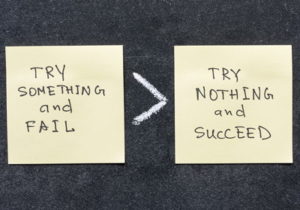 This is something that affects many different aspects of how you live your life. Action bias is the need to do something, rather than do nothing. Even if there is no need to do anything, or if it is in your best interests to do nothing, the need to do something is there, and this is action bias.
This is something that affects many different aspects of how you live your life. Action bias is the need to do something, rather than do nothing. Even if there is no need to do anything, or if it is in your best interests to do nothing, the need to do something is there, and this is action bias.
Sitting quietly and passively letting the world go by is not something that we naturally do, we want to be involved and make our mark. Translate this to the poker table, and in poker terms, doing something would be calling and getting involved in a game while doing nothing would be folding.
Doing nothing and folding may be the best course of action, but this bias means we want to do something and get involved, even if it is not quite the best time to do so. This is one you need to fight if you can, as it will affect your gaming and potentially put you in hands that you don’t need to be in.
For example:
You have been dealt four very poor hands in a row, and sensibly, you have folded every time without playing. With the fifth hand, you are dealt another poor hand. At some point, action bias will kick in and you will want to make a move, even if you have a poor hand.
If you do this, and the fifth hand is poor again, you may find yourself more inclined to play it, even though you know it’s poor, just because you want to get involved in the game and do something. The best players avoid this and treat every single hand separately, so regardless of what they have played before if a hand is poor, they will fold.
Hot Hand Fallacy
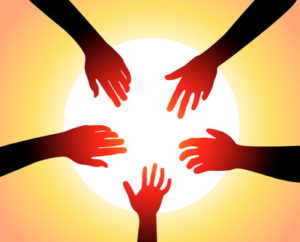 This may be one of the most dangerous types of bias and behaviours that you need to avoid as a gambler of any kind. The basis of hot hand fallacy is that this is the feeling you get when you are on a good run. You believe you are on a good run and start to bet either with bigger stakes or in a more confident fashion because of this.
This may be one of the most dangerous types of bias and behaviours that you need to avoid as a gambler of any kind. The basis of hot hand fallacy is that this is the feeling you get when you are on a good run. You believe you are on a good run and start to bet either with bigger stakes or in a more confident fashion because of this.
There is a great danger here that your decision making will be clouded, and you will have poor judgement, and the reason why many people don’t spot it is that it comes at a good time when you are happy.
It is vitally important to remember that poker hands are not linked in any way. Just because you have won a hand, doesn’t mean that you are more likely to win the next hand. However, due to hot hand fallacy, some people will think this way, and even more, will do so if they win a few hands in a row.
Yes, you may be on a good run and winning, but don’t let that affect anything that you do in the future, as you will push yourself into doing things you normally wouldn’t. It’s not easy, but the best players have the ability to split down every single game and not link them, this is what you need to aim for.
Confirmation Bias
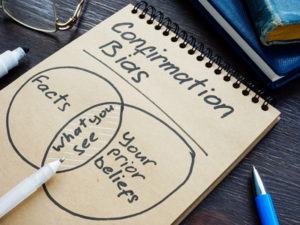 We’ve just spoken about not allowing the past to dictate what you do in the future with hot hand fallacy, and the same principles are in place for confirmation bias, another thing to be wary of.
We’ve just spoken about not allowing the past to dictate what you do in the future with hot hand fallacy, and the same principles are in place for confirmation bias, another thing to be wary of.
When it comes to poker, confirmation bias is all about looking at what has happened in the past and allowing those beliefs and memories to be your reasoning for the way you play. Instead of looking at each hand or game on its own merits we allow past experiences to shape our beliefs, if something worked before surely it will work again.
For example:
You were playing poker on the previous day and during that game, you landed a big win with a hand that started with being dealt a pair of 5s. In your current game, you are dealt a pair of 5s again. Instantly, your mind will go back to the previous day when you landed the big win and tie that to having a pair of 5s, which you have again.
That game was very different, the players were different, it is almost impossible that the players you are with now will have the same cards and play in the same way. Therefore, the same outcome cannot be expected to happen, but confirmation bias means that your mind will work as though it could happen.
This will force you to bet, perhaps bet more than you normally would, because of the memory in your head. Poker is all about what is happening on the table right now, the past does not matter and following the past too much is confirmation bias, which you do not want to find yourself doing.
Outcome Bias
 There are two sides to outcome bias and both can be bad for you if you read too much into the games you are playing. Outcome bias is when you base your ability on the recent games you have played. For example, if you are winning and doing well then you will think you are a good player. If you lose and go on a bad run, you will think you are a poor player.
There are two sides to outcome bias and both can be bad for you if you read too much into the games you are playing. Outcome bias is when you base your ability on the recent games you have played. For example, if you are winning and doing well then you will think you are a good player. If you lose and go on a bad run, you will think you are a poor player.
Your own thoughts on the ability you have will determine how you bet moving forward, so you need to make sure you don’t have any big thoughts on this. A player who is feeling good and has an inflated opinion of their ability due to a good recent run may find themselves betting with higher stakes or taking risks by playing hands that they wouldn’t normally play.
The same can happen the opposite way too. If you have a lower opinion of yourself, due to a bad run, you may find yourself limiting what you do, either by not playing as many hands or by putting forward smaller stakes.
Every hand is different, and they are not linked to what has happened previously, so you should treat them like that and bet accordingly.
Overconfidence
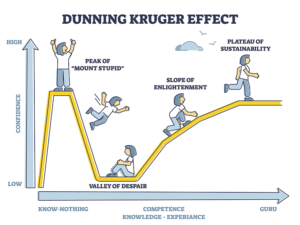 We’ve spoken about many things already that can lead to overconfidence and the dangers of that. However, overconfidence can also be something that you simply bring to the table yourself, with nothing else having any impact.
We’ve spoken about many things already that can lead to overconfidence and the dangers of that. However, overconfidence can also be something that you simply bring to the table yourself, with nothing else having any impact.
This is about your mindset as you go onto a poker table. Yes, you should feel good, and you want to win when you play, but overconfidence can lead to complacency and bad decisions, which you don’t want.
Being overconfident can be linked to several things, which you should try to avoid before you sit down and play poker. You shouldn’t have heightened emotions in any way, and definitely shouldn’t be playing while drinking. These can all lead to you being overconfident, which then leads to participating and playing more hands, as well as betting in larger stakes than you should be.
Herd Mentality
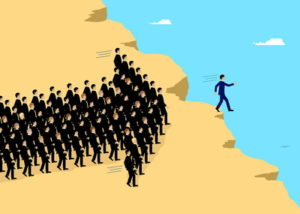 Poker is a game where you have to work out as much as you can about the players you are against. You need to look at their betting styles, what they do and any patterns they are showing. There is a lot of focus on the others around the table, but you cannot let this affect your betting plan.
Poker is a game where you have to work out as much as you can about the players you are against. You need to look at their betting styles, what they do and any patterns they are showing. There is a lot of focus on the others around the table, but you cannot let this affect your betting plan.
In terms of betting and poker playing, herd mentality is where you follow the pack and do the same as them. On a poker table, the danger with this is that if everyone decides they are going to play and they bet into the pot, you will follow them.
This may be with a hand that you shouldn’t be betting on, but because everyone else has placed a bet and is continuing the game, you feel obliged to do the same.
Poker is an individual game where you play by yourself and for yourself. However, it is also a game where you have to really study and focus on the individuals that you are playing against. This must be done, but make sure you remain an individual and play the game for yourself. If this means you are the only one to fold and not bet on the hand, then that is fine and that is just you being disciplined at the table.
Commitment Effect
 Something that people who play games like poker have to look out for is the commitment effect. This can happen with any type of gambling that gives you multiple opportunities to make a decision, such as poker, where you can bet or fold on many occasions during a hand.
Something that people who play games like poker have to look out for is the commitment effect. This can happen with any type of gambling that gives you multiple opportunities to make a decision, such as poker, where you can bet or fold on many occasions during a hand.
The commitment effect is staying involved in the game because you are committed, even when you are in a situation where the best decision would be to get out. Often it is best to cut your losses and give up, rather than chase something, and the commitment effect is exactly that, chasing and remaining involved in something you shouldn’t.
At each moment when you need to make a decision as to whether you stay in our get out of a game, you need to clearly look at the position you are in. Things can quickly change, either the betting goes up, or a new card is turned which changes your hand completely.
If you decide to stay in, just because you feel already committed to the hand, then while this may work from time to time, overall, this will only lead to problems. Don’t be scared to get out and cut your losses, to avoid poor decision making and costing yourself even more cash.
Superstitions
 You will hear many players talking about superstitions or performing a variety of different rituals depending on what happens in the game. You may feel like these are bringing you luck and putting you on the right path, but actually they are having an impact on your betting, and not always in a good way.
You will hear many players talking about superstitions or performing a variety of different rituals depending on what happens in the game. You may feel like these are bringing you luck and putting you on the right path, but actually they are having an impact on your betting, and not always in a good way.
Poker is a game of skill where you need to deal in facts and probability. Having superstition will not help this in any way, and it is something you avoid. Doing something because you believe it will bring you luck, rather than making a rational choice, is not a style of play that you want to get yourself in.
A clear head, with no pre-meditated thoughts and no styles of play based on lucky charms and anything other than facts and probability is what you need if you want to make a success of the poker table.
Social Pressure
 The final aspect to mention is social pressure. You will feel this even more if you are playing in public with others, but this can also be felt online too. Whether this is during a chat with friends, playing alongside them or from strangers at the table, this is something that can affect how you play.
The final aspect to mention is social pressure. You will feel this even more if you are playing in public with others, but this can also be felt online too. Whether this is during a chat with friends, playing alongside them or from strangers at the table, this is something that can affect how you play.
There will be pressure on you while playing, this is something that poker players have to accept. However, you should just allow that to happen, rather than bowing to the pressure and changing how you play because of it.
Although these people may sound like they are right, they do not sit in your position and do not see what you see. That means they can’t make the right decisions, even if they talk a good game and put pressure on you to follow them.
Yes, you can listen to others and talk about poker with them, but do not change your style of play in any way to suit what they are saying to you.
